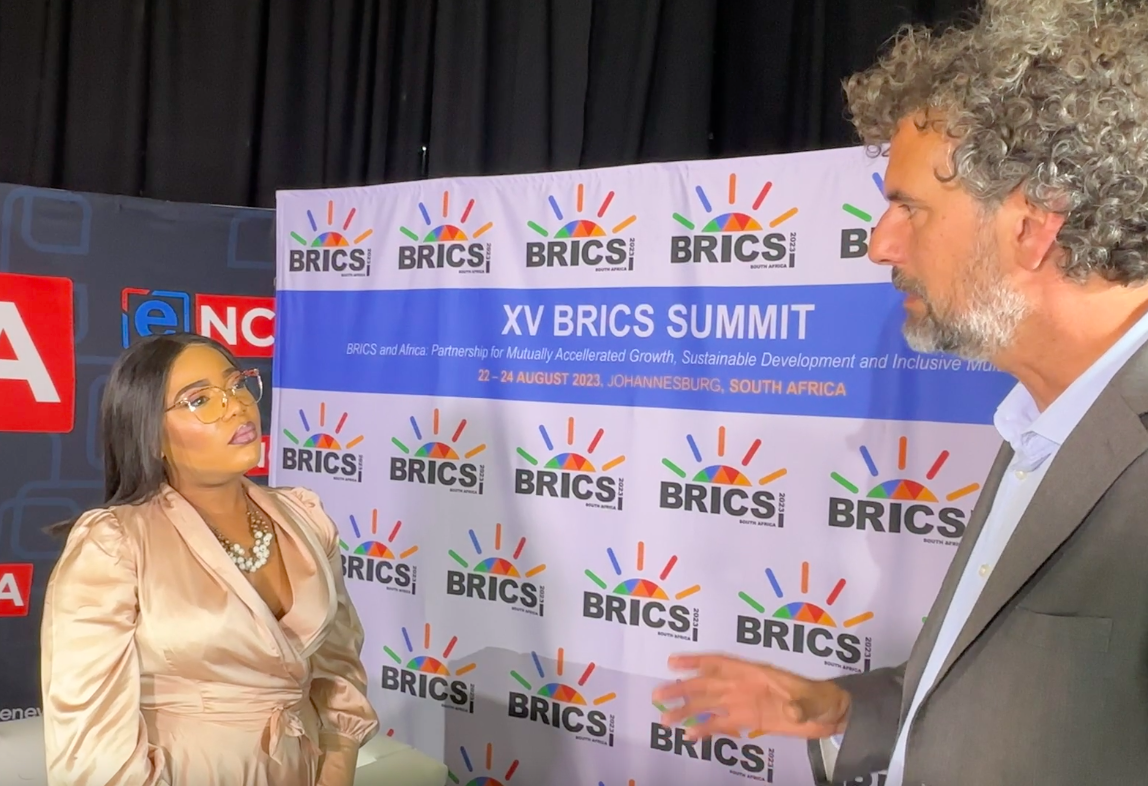Reporting from Johannesburg / South Africa
We are continuing to publish our interviews on the margins of the BRICS summit in Johannesburg, South Africa. To deepen insight into South African economic perceptions and expectations on the summit, the BRICS enlargement and trade in national currencies, we spoke to Rofhiwa Madzena. Madzena is a business journalist at South African eNCA TV, and former reporter for CNBCAfrica and Forbes Africa.
South Africa is hosting the BRICS Summit, but there is pressure on the country, especially regarding on its relations with Russia, you told me.
Yes, so over the last few months, South Africa has been criticized quite a bit for its perceived friendliness with Russia. And that is after the US ambassador said that there was a ship, the ‘Lady R’, that came and took weapons to Russia from South Africa. They have since taken that statement back, but there are investigations into what exactly was on the ship.
So that has brought up concerns from the US as to how friendly South Africa is with Russia and that’s because South Africa has had a non-aligned stance throughout the Russian invasion and that incident made it seem as though South Africa was too friendly with Russia.
So the BRIC summit is important for us not only because of the political developments between the nations, but also because of the growth agreement that southern African countries currently have with the United States. It’s called AGOA, African Growth and Opportunity Act.
US blackmailing over prolongation of free trade agreement
And the agreement is up for renewal. And there were negotiations, so to say. The US said, ‘well, we’re going to review South Africa’s participation in this’. And the reason that this is so important for us is that it contributes over 8 billion rand to our GDP every year. We have South African businesses, wine producers, agricultural business, fruit, and many other manufacturers, especially in the automotive sector, that export duty-free to the United States. And we get a huge amount of revenue from the duty-free trade. If we lose that, businesses in South Africa will suffer. That is the big risk at the moment for our economy.
So, how do you see the position of the South African government in facing these negotiations?
South Africa did go to the United States. They sent a delegation just before the BRICS Summit to reaffirm its non-aligned movement stance towards Russia.
To reaffirm it?
Yes, to reaffirm its non-aligned stance with Russia and to plead a case to the United States to say ‘we need the agreement to be renewed, we cannot be removed from this crucial trading deal’. And it’s important for South Africa to highlight this to the United States because currently South Africa only has a trade of about 2% of its GDP with Russia.
That’s not much at all. And even then, the right thing to trade there is mainly on energy, and that already is at a deficit. So, if we are looking at our trading partners and where the bulk of economic growth comes from, that would be the European Union and the United States, which are currently our biggest trading partners, and then China, of course, coming in there as well.
Move away from reliance on the West
May, South Africa in this context also demand more support, let’s say, from the other BRICS countries because they are facing similar demands from the United States to choose their sides or not to choose their sides but to choose the American side in the conflict. May there be a coordination among the BRICS countries in response to these American pressures?
Yes, and that’s actually one of the discussions that we are anticipating will happen. We’ve heard about them establishing a BRICS currency. There was the New Development Bank that was established, and that already in itself was established to rival the likes of the IMF and the World Bank. So it is a concerted effort to move away from the reliance on the global West and creating a new form of a G20 if you will, where it will be beyond just these five countries within the trading bloc and the reliance on a United States will be reduced quite significantly.
And I think the reason that you’re also seeing concerns being raised by the United States is the opportunity that this bloc, if it gets any bigger, to supersede the United States or the biggest economy. Currently, the five big, the five BRICS countries together make up a third of global growth. A third of global GDP comes from the five BRICS countries. That’s about 30%. The United States contributes about 15% on its own.
If you are going to see a bigger rally, the absorption of other countries, then you are easily cutting off your reliance on the global west. And that is, I think, a big concern for the United States in that in as much as Africa and other developing nations need the United States, Africa and other developing nations have resources that the United States relies on.
A critical question: The Americans are negotiating not to prolong the free trade deal. That would mean that South Africa loses a market there. Can other countries that join the BRICS substitute that market? For instance, can Argentina be a substitute? Does South Africa have that perspective?
That is the plan, yes. There are certain commodities and products that we have that will be used as a selling point to Argentinians, Saudi Arabians, other countries that want to become part of the trading bloc where South African businesses can benefit from. They are new markets, smaller markets, but the potential for growth is big.
Trading in Dollars is “costly”
A lot of discussion takes place about international system and national currency, both in trade but also some aspect in finance. What does that mean for South Africa?
The idea is not to create one certain currency, but to start by allowing BRICS countries and the new entrants, as you heard today being announced, to at least trade in their local currencies.
The problem with depending on the US dollar, which is a global phenomenon now, is that it’s costly to buy certain goods, or to import certain goods, and those exporting won’t necessarily benefit as much because of the US dollar and the inflation that’s now added to the state of the US dollar.
A de-dollarization is not necessarily the creation of a new currency, but the allowance for trade and investment to happen with local currencies, and for financing institutions like the New Development Bank for example, to have those reserves of various foreign currencies and not just necessarily the Euro. The argument is made that it cannot be that you’ve got five developing nations that all trade with one another using the US dollar, something that is not sustainable and unfortunately not affordable for many people living within those countries who are the end users of whatever has been purchased.
So, but then: What exactly is the advantage of trading in local currencies?
Well, if you trade in local currency, that means the value of your money increases.
What the US dollar has done through the tough economic climate and the high inflation was to reduce the value of local or emerging market currencies, because of the interest rate hike cycle that has been done by the United States. That strengthens the US dollar because of investment return on bond yields and in turn it weakens emerging market.
You’ve seen in Russia that the ruble has collapsed, and they were forced to react with interest rates. We’ve seen a weakening of other emerging market currencies as well as a result. And that’s why it would be of value to the man on the street. Your 100 Rand, which is our currency, would buy a lot more than it currently does now.
Do you see chances for this trend to progress further?
I think because the six new countries don’t trade in the US dollar, right, they might drive that conversation a lot more because they are already doing trade in their currencies and so there might be a greater push of lending members from next year obviously our active members for them to be an alternative to the US dollar.
Okay, then from a macroeconomic point of view, what means the joining of these six new countries to the BRICS? What will change economically?
Immediately, not much, but it has the potential of allowing the current five trading partners to be exposed to greater markets and to increase trade between them because currently trade between the five BRICS countries is only at 6%. They trade more with the Saudi Arabia’s and UAE’s than they do within the block.
The opening up of that block not only opens up the markets for everybody involved, but it also allows for smaller and medium-sized businesses to be exposed to new markets and ultimately contribute to economic growth. It also allows for the two African countries that have been added on for the further advancement of the Africa Free Trade Area, which is the trading agreement within Africa that they’re trying to implement over a few years now, but it makes it a little bit easier when there are more people involved and a break is set off.
This interview was conducted on behalf of TelesurTV.

















Leave a Reply